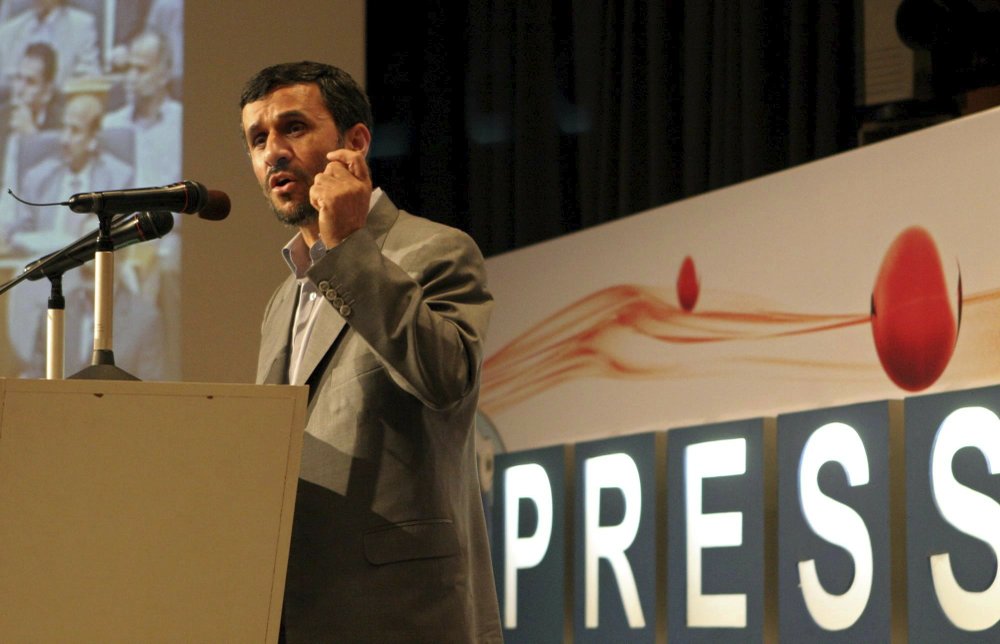
DUBAI, United Arab Emirates (AP) — Iranian state television has broadcast the suspected coerced confessions of at least 355 people over the last decade as a means to both suppress dissent and frighten activists in the Islamic Republic on behalf of security services, according to a report released Thursday.
The study published by Justice for Iran and the International Federation for Human Rights outlined cases of prisoners being coached into reading from white boards, with state television correspondents ordering them to repeat the lines while smiling.
Others recounted being beaten, threatened with sexual violence and having their loved ones used against them to extract false testimonies later aired on news bulletins, magazine-style shows and programs masquerading as documentaries, the report said.
The number of those filmed likely is even higher as some say their coerced confessions have yet to air, while others may not have been immediately accessible to researchers, said Mohammad Nayyeri, co-director of Justice for Iran.
“They always live with that fear of when it’s going to happen,” Nayyeri told The Associated Press. “So that fear itself in those cases is not less than the fear and the anguish and pain of those whose confessions have been broadcast.”
Emails sent to Islamic Republic of Iran Broadcasting, the state television and radio firm, could not be delivered. Iran’s mission to the United Nations did not respond to a request for comment.
Under Iranian law, only the state can own and operate television and radio stations. Satellite dishes, though prevalent across Tehran, remain illegal. YouTube and other Western video streaming services are blocked. That leaves many watching IRIB across its multiple national and provincial stations.
While state TV channels remain a major force across much of the Mideast, IRIB particularly appears influenced by state security agencies like Iran’s Intelligence Ministry, its military and the intelligence arm of the country’s paramilitary Revolutionary Guard.
“IRIB operates as a media hub that links a vast network of security, intelligence, military and judicial organizations,“ the report said. “IRIB is not simply a media organization and by no means an independent one, but rather an organ of state suppression that uses the tools of mass communication.”
That translates to a focus on Iranian military production and exercises to airing confessions long criticized by Europe and the US, as well as human rights groups.
Washington sanctioned a bank supporting IRIB in November 2018 and later its director, Abdulali Ali-Asgari. The US Treasury says IRIB “routinely broadcasts false news reports and propaganda, including forced confessions of political detainees.” US prosecutors even allege an IRIB staffer recruited a former US Air Force intelligence analyst for the Guard.
However, sanctions on IRIB itself have been waived every six months since being imposed by the Obama administration in 2013, in part over what the State Department has described as “Iran’s commitment to ensure that harmful satellite interference does not emanate from its territory.”
The use of televised, coerced confessions dates back to the chaotic years immediately after Iran’s 1979 Islamic Revolution. State television aired confessions by suspected members of communist groups, insurgents and others. Even Mehdi Bazargan, Iran’s first prime minister after the revolution, warned at one point he could be detained and put on television “repeating things like a parrot.”
There have been a number of famous cases of aired coerced confessions, like that of Newsweek correspondent Maziar Bahari, who got British regulators to revoke the license for Iranian state television English-language arm Press TV over airing his.
The report by Justice for Iran and the International Federation for Human Rights describes in detail the case of Maziar Ebrahimi, who later said Intelligence Ministry officials tortured him and 11 others into giving coerced confessions falsely claiming they assassinated nuclear scientists on behalf of Israel.
“Even after confessing to the assassination of the Iranian nuclear scientists, Ebrahimi was still tortured and pressurized to take responsibility for another unsolved case of the explosion in the missile factory in Mallard,” the report said.
Ebrahimi later was freed and left Iran for Germany. After the BBC’s Persian service reported on his story, Iranian government spokesman Ali Rabiei in August called the Ebrahimi’s torture “unprofessional” and said those responsible would be held accountable.
To date, there has been no public announcement of such a reckoning taking place.
But there are many more, according to the report, including those who have yet to see their confessions broadcast. Those sheer numbers over the last decade came as a surprise to Nayyeri and other researchers.
“It was because of the sheer shock of the numbers that we decided to give it more attention,” he said. ”You put them together and then, only then, you see how huge the problem is. It is not just every now and then. No, this is systematic. This is continuous.”
___
Image: In this July 2, 2007, file photo, the then President Mahmoud Ahmadinejad delivers his speech during inauguration ceremony for Iran’s first English-language channel, Press TV, as its logo is seen in background, in Tehran, Iran. (AP Photo/Vahid Salemi, File)




